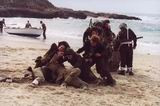
It is the beginning of 1948. The old cargo boat Kedma is nearing the shore with hundreds of Jews from every corner of Europe crowded on board, all looking for the Promised Land. Immediately after the new State of Israel is proclaimed war breaks out between Arabs and Jews. Few of the refugees survive....

It is the beginning of 1948. A decisive conflict between the Jews and Palestinians is approaching. The old cargo ship Kedma is heading for the shore, laden with hundreds of Jews from all corners of Europe. They survived the war in ghettos, they fled the transports and they want at any cost to escape from Europe to the “Promised Land”. On the beach, awaiting the arrival of the boat, is Mussa, commander of Palmach, an underground semi-military Jewish organisation, and also British soldiers whose task is to capture the Jewish immigrants and send them back. After a bloody gun battle, some of the Kedma refugees take off into the nearby mountains. A fearful journey follows during which the refugees join up with a convoy heading for besieged Jerusalem. They acquire some weaponry and take part in an attack on an Arab village whose defenders have formed a roadblock. Many of the refugees, who had hoped to find a new home in Palestine after their terrible war experiences, die in the crossfire. Nevertheless, they succeed in getting through and the convoy, with its supplies, is able to continue on its way to Jerusalem.
100 min / Black & white, 35 mm
Director Amos Gitai
/ Screenplay Marie-José Sanselme, Amos Gitai
/ Dir. of Photography Yorgos Arvanitis
/ Music David Darling, Manfred Eicher
/ Editor Kobi Netanel
/ Producer Michel Propper
/ Production MP Productions, Agav, Arte France Cinéma
/ Cast Andrei Kashkar, Elena Yaralova, Yussef Abu Warda, Moni Moshonov, Juliano Merr, Menachem Lang

Amos Gitai (b. 1950, Haifa) studied architecture at the Isreal Institute of Technology (1971-75) and shot his first amateur films there. He rounded out his study of architecture with a doctorate from the University of California, Berkeley in 1986. Beginning in 1977 he made documentaries for Israeli television. The documentaries House (1980) and Field Diary (1982) were censured by the state and as a result Gitai emigrated to France. In his documentaries and features Gitai attempts to authentically and realistically treat recent Israeli history. Other films (selected) - documentaries: Wadi (1981), Wadi - Ten Years Later (1991), Queen Mary (1993), In the Name of the Duce (1994), Zion, Auto-Emancipation (1998); features: Esther (1985), Berlin-Jerusalem (1989), Golem, The Spirit of Exile (1991), Devarim (Things, 1995), Yom Yom (Day After Day, 1998), Kadosh (Sacred, 1999), Kippur, War Memories (2000).
First-hand brews throughout the year.
Be among the first to learn about upcoming events and other news. We only send the newsletter when we have something to say.